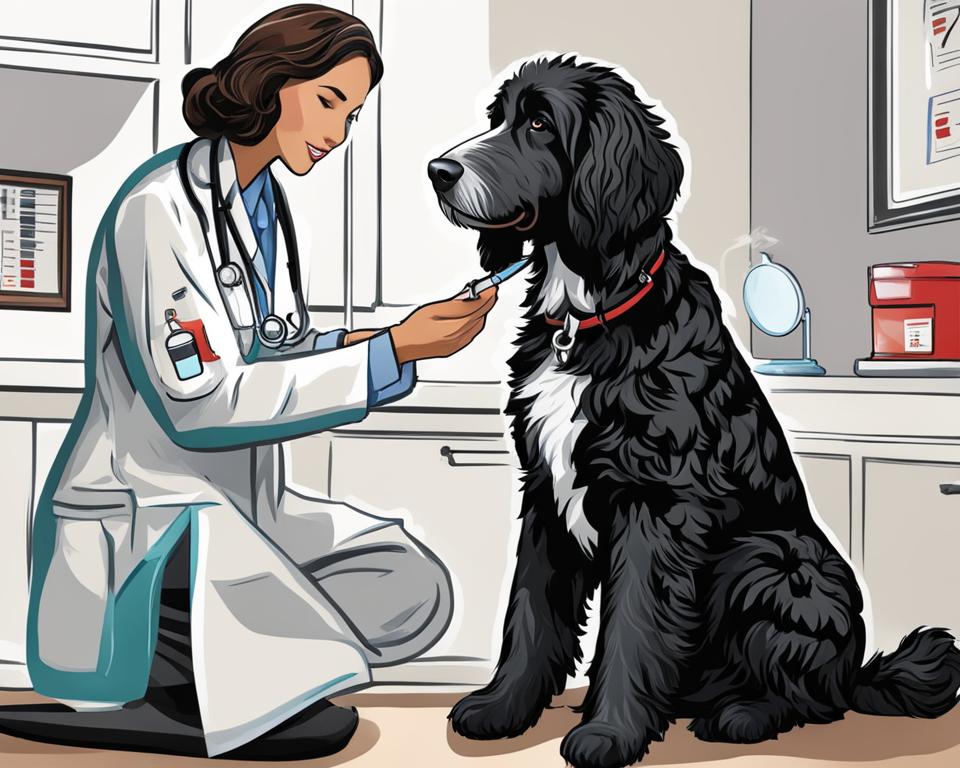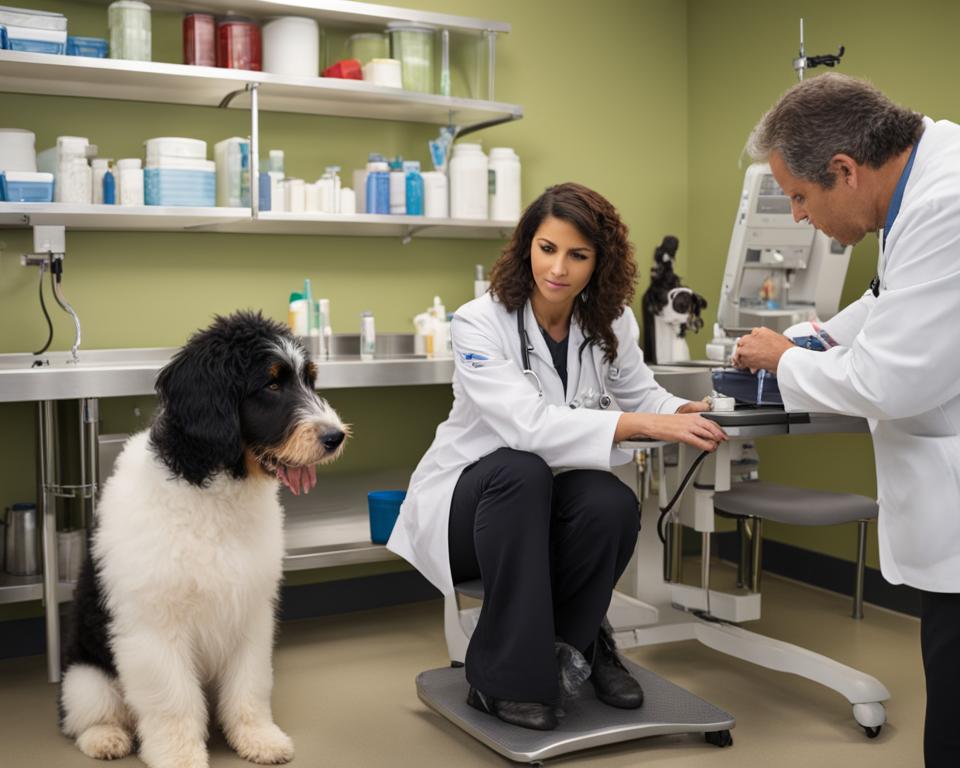Health testing plays a crucial role in responsible breeding programs, especially when it comes to Bernedoodles. These adorable dogs can be prone to certain inheritable health conditions that can impact their quality of life. By conducting thorough health screenings, breeders can significantly reduce the risk of these conditions appearing in Bernedoodle puppies.
Health screenings for Bernedoodles encompass genetic tests, which identify disease-causing mutations in the DNA of dogs, and phenotypic tests, which include physical examinations and diagnostic procedures like x-rays and ultrasounds. Breeders tailor these tests to target the specific health issues commonly found in Bernedoodles, ensuring the healthiest puppies possible.
Key Takeaways:
- Health testing is essential for responsible Bernedoodle breeding programs to reduce the risk of inheritable health conditions.
- Genetic health tests identify disease-causing mutations, while phenotypic tests involve physical examinations and diagnostic procedures.
- Breeders tailor health screenings to the specific issues found in Bernedoodles.
- Choosing a breeder who conducts thorough health tests is crucial for acquiring a healthy Bernedoodle.
- Ensure a lifetime of optimal health for your Bernedoodle through balanced diet, regular exercise, and routine veterinary check-ups.
Common Health Issues in Bernedoodles
Bernedoodles, like any other breed, are prone to certain health issues that may affect their overall well-being. It is important for potential Bernedoodle owners to be aware of these common health problems to ensure they can provide the necessary care and proactive measures to keep their furry companions healthy and happy.
Some of the health issues commonly seen in Bernedoodles are:
- Von Willebrand’s Disease (vWD): A genetic disorder that affects the blood’s ability to clot properly.
- Degenerative Myelopathy (DM): A progressive disease that affects the spinal cord and can lead to paralysis.
- Progressive Retinal Atrophy (PRA): A degenerative eye condition that leads to vision loss and eventual blindness.
- Hip Dysplasia: A condition where the hip joint does not develop properly, leading to pain and mobility issues.
Responsible breeders prioritize the health of their Bernedoodles and take necessary steps to minimize the risk of these hereditary health problems. This includes conducting thorough health screenings on their breeding dogs to ensure they are free from these conditions. Potential Bernedoodle owners should inquire about the breeder’s health testing practices and request to see the results of the screenings.
By choosing a breeder who follows the recommended health screening guidelines for Bernedoodles, individuals can have peace of mind knowing they are getting a puppy with a lower risk of inherited health issues. Regular veterinary check-ups, a balanced diet, exercise, and a safe environment are also essential for maintaining the optimal health of Bernedoodles throughout their lives.
Health Issues in Bernedoodles Table
| Health Issue | Description |
|---|---|
| Von Willebrand’s Disease (vWD) | A genetic disorder that affects the blood’s ability to clot properly. |
| Degenerative Myelopathy (DM) | A progressive disease that affects the spinal cord and can lead to paralysis. |
| Progressive Retinal Atrophy (PRA) | A degenerative eye condition that leads to vision loss and eventual blindness. |
| Hip Dysplasia | A condition where the hip joint does not develop properly, leading to pain and mobility issues. |
Importance of Health Testing for Bernedoodle Parents
Comprehensive health screenings play a crucial role in ensuring the well-being of Bernedoodle parents and the future generations they produce. By prioritizing health testing, responsible breeders can significantly reduce the risk of inherited health issues in Bernedoodle puppies. Genetic testing is a fundamental component of health screening, allowing breeders to identify and avoid breeding dogs that carry disease-causing mutations.
Genetic health tests examine the DNA of Bernedoodle parents to detect the presence of specific mutations associated with heritable conditions. By screening potential breeding dogs, breeders can make informed decisions that contribute to the overall health of the Bernedoodle population. In addition to genetic tests, physical abnormalities that have hereditary connections, such as hip dysplasia and patellar luxation, should be screened through radiographic testing and regular checkups.
Meeting the health testing standards established by organizations like the Goldendoodle Association of North America and Good Dog is essential for breeders striving to produce healthy Bernedoodle puppies. These certifications demonstrate a breeder’s commitment to responsible breeding practices and prioritize the health of their breeding stock. By ensuring that Bernedoodle parents are free from genetic diseases and physical abnormalities, breeders can promote optimal health in future generations of Bernedoodles.
| Benefits of Health Testing for Bernedoodle Parents | Consequences of Neglecting Health Testing |
|---|---|
| – Reduces the risk of inherited health issues – Ensures the production of genetically healthy puppies – Contributes to the overall well-being of the Bernedoodle population |
– Increased likelihood of passing on genetic diseases – Higher risk of puppies developing physical abnormalities – Potential negative impact on the breed’s reputation and future |
Selecting a Responsible Breeder for Healthy Bernedoodles
When it comes to choosing a Bernedoodle breeder, health testing practices should be a top priority. A responsible breeder understands the importance of screening their breeding dogs for heritable health conditions and will be transparent about their testing protocols. As a potential owner, it’s essential to inquire about the specific health tests performed and request documentation of the results.
Following Bernedoodle health screening guidelines ensures that breeders are taking the necessary steps to produce genetically healthy puppies. These guidelines may include recommended tests for conditions such as Von Willebrand’s Disease (vWD), Degenerative Myelopathy (DM), Progressive Retinal Atrophy (PRA), and hip dysplasia. By choosing a breeder who adheres to these guidelines, you can have peace of mind knowing that the puppies are more likely to be free from these common health issues.
A responsible breeder will not only prioritize health testing but also prioritize the well-being of their breeding dogs. They will provide a safe and nurturing environment, appropriate medical care, and a balanced diet. Additionally, they will offer recommendations for keeping Bernedoodles healthy throughout their lives, including advice on exercise, grooming, and general care.

| Health Test | Recommended Frequency |
|---|---|
| Von Willebrand’s Disease (vWD) | Annually |
| Degenerative Myelopathy (DM) | One-time test |
| Progressive Retinal Atrophy (PRA) | One-time test |
| Hip Dysplasia | Annually |
By selecting a responsible breeder who follows health screening recommendations for Bernedoodles, you are not only ensuring the health of your future pet but also supporting ethical breeding practices. Take the time to research and ask questions, as a reputable breeder will be happy to provide information and demonstrate their commitment to producing healthy Bernedoodle puppies.
Ensuring a Lifetime of Optimal Health for Bernedoodles
Health screenings are a crucial step in maintaining the well-being of your Bernedoodle. However, it’s important to remember that there are other factors that contribute to their overall health and happiness. By following a few key guidelines, you can ensure a lifetime of optimal health for your beloved furry friend.
First and foremost, providing a balanced diet is essential. Consult with your veterinarian to determine the appropriate food and portion sizes for your Bernedoodle’s specific needs. A high-quality diet will support their growth, maintain a healthy weight, and promote strong bones and a shiny coat.
In addition to nutrition, regular exercise is vital for Bernedoodles. These active and intelligent dogs thrive on physical activity. Engage them in daily walks, play fetch in the backyard, or even consider agility training. Keeping your Bernedoodle mentally and physically stimulated will contribute to their overall well-being.
Don’t forget about regular veterinary check-ups and vaccinations. Your veterinarian will monitor your Bernedoodle’s health, provide necessary preventative treatments, and address any concerns or issues that may arise. Staying up to date with vaccinations will help protect your Bernedoodle from common canine diseases.
By following these Bernedoodle breed health requirements and adopting a proactive approach to their health, you can ensure that your Bernedoodle enjoys a long, happy, and healthy life by your side.
FAQ
Why are health screenings important for Bernedoodles?
Health screenings are essential for Bernedoodles to identify and reduce the risk of inherited health conditions. By conducting genetic and phenotypic tests, breeders can ensure the production of healthy puppies.
What are some common health issues in Bernedoodles?
Common health issues in Bernedoodles include Von Willebrand’s Disease (vWD), Degenerative Myelopathy (DM), Progressive Retinal Atrophy (PRA), and hip dysplasia. These conditions can be screened through health tests.
Why is health testing important for Bernedoodle parents?
Health testing is crucial for Bernedoodle parents to avoid breeding dogs with disease-causing mutations or physical abnormalities. Genetic testing and physical examinations can help breeders produce genetically healthy puppies.
How can I select a responsible breeder for healthy Bernedoodles?
When choosing a breeder, it’s important to inquire about their health testing practices. A responsible breeder should be transparent about the tests performed on their dogs and should prioritize the health and well-being of their breeding dogs.
How can I ensure a lifetime of optimal health for my Bernedoodle?
Besides health screenings, it’s important to provide a balanced diet, regular exercise, and a safe environment for your Bernedoodle. Regular veterinary check-ups, vaccinations, and preventative treatments are also essential for their overall well-being.

Leave a Reply